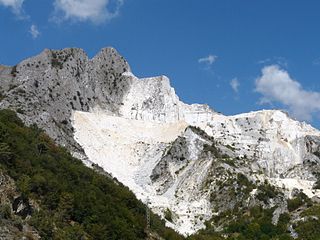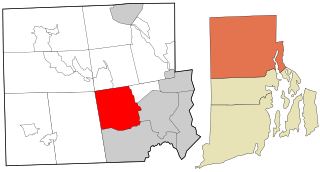
The Rose Island Light, built in 1870, is on Rose Island in Narragansett Bay in Newport, Rhode Island in the United States. It is preserved, maintained and operated by The Rose Island Lighthouse Foundation.

This is a list of properties and districts listed on the National Register of Historic Places in Rhode Island. As of May 29, 2015, there are more than 750 listed sites in Rhode Island. All 5 of the counties in Rhode Island have listings on the National Register.

The Eleazer Arnold House is a historic house built for Eleazer Arnold in about 1693, and located at 487 Great Road, Lincoln, Rhode Island in the Great Road Historic District. It is now a National Historic Landmark owned by Historic New England, and open to the public on weekends.

The Clemence–Irons House is a historic house at 38 George Waterman Road in Johnston, Rhode Island. It was built by Richard Clemence in 1691 and is a rare surviving example of a "stone ender", a building type first developed in the western part of England and common in colonial Rhode Island. The house is listed on the National Register of Historic Places, and is a historic house museum owned and operated by Historic New England. It is open Saturdays between June and mid-October.
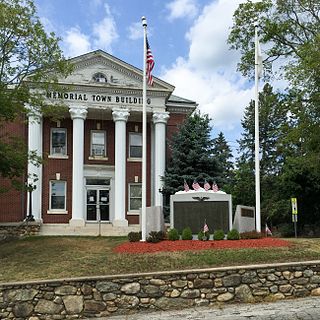
Slatersville is a village on the Branch River in the town of North Smithfield, Rhode Island, United States. It includes the Slatersville Historic District, a historic district listed on the National Register of Historic Places. The historic district has been included as part of the Blackstone River Valley National Historical Park. The North Smithfield Public Library is located in Slatersville.

Lime Rock (Limerock) is a village and historic district in Lincoln, Providence County, Rhode Island, United States, near Rhode Island Route 146. The village was named after the limestone quarries in the area, which started in the 17th century, and continue to the present where Conklin Limestone Company now operates. Because of the abundance of limestone in the area many houses had massive end chimneys and were called "stone enders," a distinctly Rhode Island style of architecture. The historic district includes 21 historically significant properties in an area extending from Wilbur Road, just west of its junction with Old Louisquisset Pike, eastward to Great Road, and then along Great Road as far as Simon Sayles Road. Among these properties are three quarries, and the ruins of three old lime kilns. It was listed on the National Register of Historic Places in 1974.

The Prudence Island Lighthouse, more commonly known locally as the Sandy Point Lighthouse, is located on Prudence Island, Rhode Island and is the oldest lighthouse tower in the state. Sandy Point is nicknamed Chibacoweda, meaning "little place separated by a passage", because the location is a little more than one mile offshore.

This is a list of the National Register of Historic Places listings in Bristol County, Rhode Island.

This is a list of the National Register of Historic Places listings in Kent County, Rhode Island.

This is a list of the National Register of Historic Places listings in Newport County, Rhode Island.

This is a list of the National Register of Historic Places listings in Washington County, Rhode Island.

The Great Road Historic District is a historic district in Lincoln, Rhode Island, commemorating a portion of Rhode Island's oldest highway, dating back to 1683. Great Road served as the main connection between Providence, Hartford and Worcester during colonial times. The district includes a 0.6-mile (0.97 km) section of the road, which winds along the Moshassuck River between a junction with Breakneck Hill Road and another with Front Street. Notable historic properties along this stretch of road include the National Historic Landmark Eleazer Arnold House, a stone-ender built in 1687, which is now a museum operated by Historic New England, the 1812 Moffett Mill, the Israel Arnold House, and Hearthside, the 1810 home of Stephen Smith, who established the adjacent Butteryfly Mill in 1811.

This is a list of the National Register of Historic Places listings in Providence, Rhode Island.

This is a list of the National Register of Historic Places listings in Pawtucket, Rhode Island.
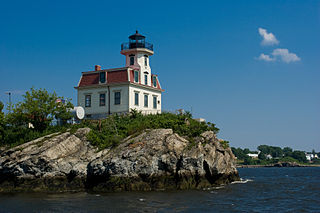
Pomham Rocks Light is a historic lighthouse in the Providence River about 200 yards (180 m) off the shoreline of the Riverside neighborhood of the city of East Providence, Rhode Island.
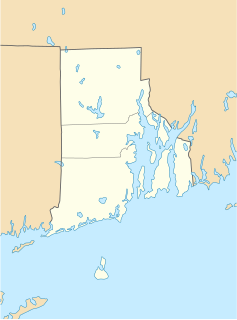
The Hazard Farmstead is a historic archaeological site in Jamestown, Rhode Island. It is the location of a major American Indian settlement whose artifacts have been dated from 2,500 BC to 1,000 AD. It appeared to be occupied seasonally from late summer to fall, and was intensively used during those times.

The U.S. Customshouse is a historic custom house at 24 Weybosset Street in Providence, Rhode Island at the northeast corner at Weybosset and Custom House streets. The customhouse was built between 1855 and 1857 to a design by Ammi B. Young and added to the National Register of Historic Places in 1972. In 1992, the building was purchased by the State of Rhode Island and converted to office space for the State Courts System. After extensive renovation at a cost of $550.000, the building was opened by the state of Rhode Island as the John E. Fogarty Judicial Complex.

The Massachusetts Hornfels-Braintree Slate Quarry is a prehistoric archaeological site in Milton and Quincy, Massachusetts. It consists of a series of pits and trenches used from 7,000 B.P. until the early 17th century as a source of slate and hornfels used for chipped and ground tools. Pieces made from material quarried at the site are found over much of eastern Massachusetts. The site was added to the National Register of Historic Places in 1980.
This is a list of Registered Historic Places in Lincoln, Rhode Island.
